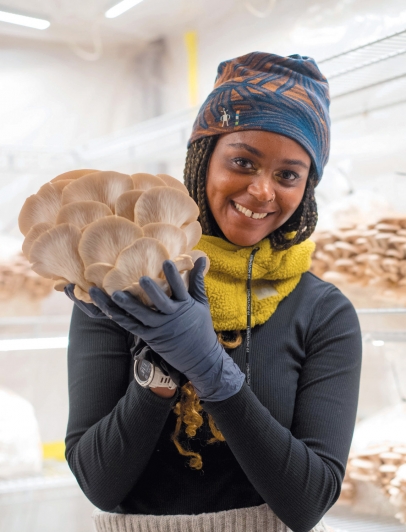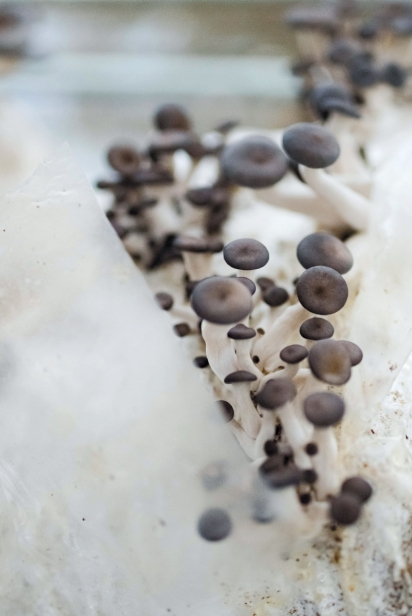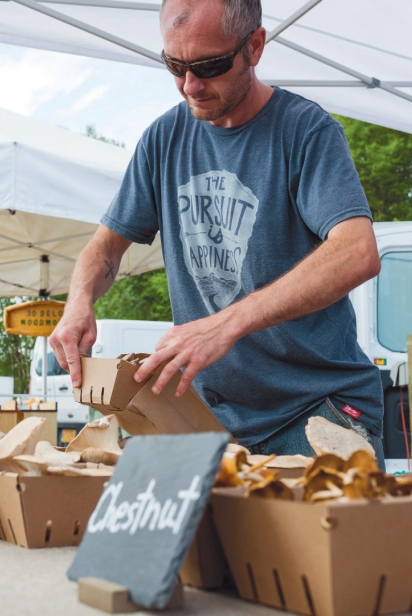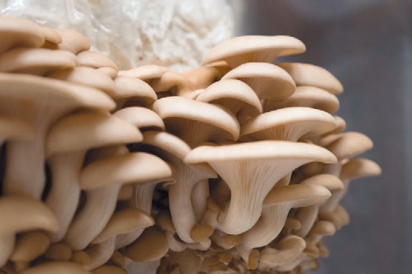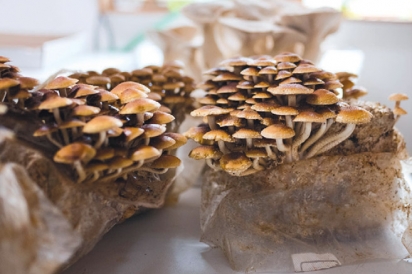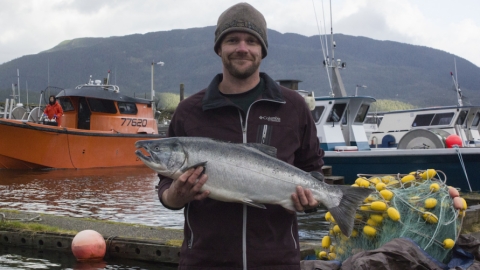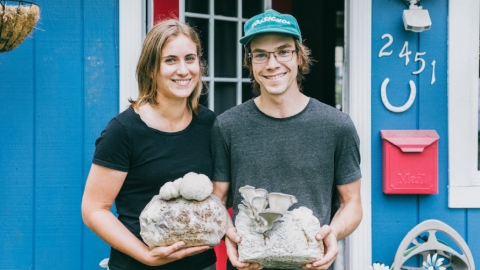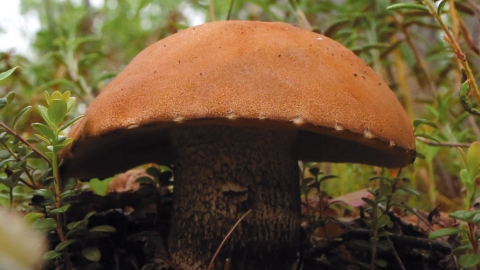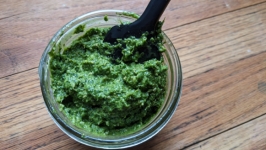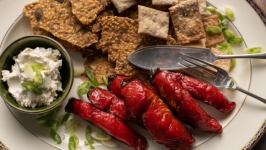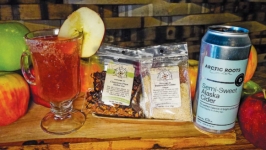Alaska's Fungi Farmers
Meet two intrepid Alaskan entrepreneurs who are inoculating new journeys in entrepreneurship, indoor farming, and the world of cultivating culinary mushrooms.
New Earth Fungi in Juneau
Fungi thrive in the lush temperate rainforests of Southeast Alaska, where foragers harvest wild mushrooms seasonally. In Juneau, locally grown mushrooms of a different kind are found in fresh produce sections of local grocery stores and restaurant dishes. One day, I spy the silken wings of large oyster mushrooms and poofy cream-colored giants called lion’s mane. These gourmet species, and others, grow at New Earth Fungi, a small indoor farm founded by mycologist and mushroom master Alannah Johnson.
Johnson first encountered mushroom cultivation over a decade ago when her friends grew shiitake mushrooms outside on logs. As her fascination with fungi increased, she continued learning how to grow mushrooms in garden beds and indoors. Originally from California, Johnson discovered the world of wild mushrooms after moving to Southeast Alaska. “I was blown away by seeing the abundance of mushrooms everywhere,” she remembers. She read research papers, consulted field guides, and taught herself mushroom identification through spore printing. While completing a bachelor’s degree in biology at the University of Alaska Southeast, Johnson linked every class project to fungi, founded the UAS mycology club, led wild mushroom forays, and taught outdoor cultivation courses.
Although Johnson had considered starting a business during college, the pandemic transformed this idea into a reality. She was abroad with the Peace Corps when all volunteers were sent home in 2020. “After coming back to Juneau, I felt a little bit lost,” she recalls. “But then I started thinking about what I love to do.” As a vegan who enjoys cooking and eating mushrooms along with growing them, Johnson decided to grow mushrooms commercially and increase local nutritious food options in Juneau.
Johnson’s indoor climate-controlled operation includes a sterile lab, incubation room, and a grow room that allows her to sell fresh oyster, lion’s mane, shiitake, and maitake mushrooms year-round, along with dried products and medicinal tinctures. Her passion and love of mushrooms shine through on her Instagram page where she posts updates, cooking tips, videos, and fabulous fungi close-ups.
As a black woman who owns a small business, Johnson shares that she is really happy to be doing mushroom cultivation for a living. “I think more people are not doing what I am doing because it comes back to a lack of people of color in science,” she says. Johnson was the only black woman in the entire biology department in college. “I hope I can inspire other black people, black women, other people of color to be more engaged in the sciences.”
The farm’s name—New Earth Fungi—came from fungi’s role as the recyclers and transformers of the world through decomposition. “It is a cyclical process of things breaking down, regenerating, and starting over. I think of new earth, a new beginning, this cycling of nutrients and new life, too,” she says. “The mushrooms are always teaching me things. Learn by trial and error. And also patience in waiting for them to fruit.”
After several years of living in a world of change and disruption, it’s inspiring to witness Johnson’s journey in adapting to change by pursuing a path that unites her knowledge, skills, and passion with the wisdom of her fungi friends.
Boreal Woods Farm in Fairbanks
In mid-summer, the bustling Tanana Valley Farmers Market in Fairbanks bursts with a delightful array of gigantic vegetables, arts and crafts, and tasty homemade treats. In 2021, a new business emerges at the center of the market under a large banner that says, “Boreal Woods Mushroom Farm.” In sandals and a T-shirt, mushroom farmer Matt Meares of Ester busily tends to colorful mushroom clusters set out in neat brown paper boxes.
I hover at each row, marveling at a cornucopia of mushrooms I had never seen before. “Chestnut” says a label in front of orange-brown mushrooms with pointy caps and crunchy stems. “Shiitake” tags an umami-laden mushroom I have only purchased in dried form. Here in their box, they tumble over each other, freshly harvested that morning. The pale funnels of king trumpets peek over at the rotund lion’s mane mushrooms nearby.
Born and raised in Ester, Meares grew up working in and managing greenhouses around Fairbanks. Years later, as a stay-at-home father, he decided to start growing mushrooms as a family-friendly activity he could do with his kids as they got older. His background in nurturing baby plants and baby humans, Meares vocation now includes nurturing mycelia into gourmet culinary mushrooms.
A visit to Meares farm on a sun-dappled birch forest on a hillside in Ester reveals that mushrooms sold under the label of Boreal Woods Fungi spend their entire life cycle in an indoor facility. Meares fungi farm is located on his family’s property where he cleaned up and converted an old barn and garage into a lab, incubation room, and grow space.
In 2021, Meares sold almost 4,000 pounds of mushrooms, making Boreal Woods the largest year-round indoor mushroom farm in the state. He also grows an astounding diversity of mushrooms, which includes blue oysters, snow oysters, pink oysters, yellow oysters, lion’s mane, king trumpets, reishi, piopinno, chestnut, black pearl, beech, and shiitake. In summer, he grows around 250 pounds a week, which includes “tropical” yellow and pink oyster varieties that require warmer temperatures. While it can take time to figure out how to meet the unique growing needs of each variety, Meares enjoys the challenge. For example, he employs a special technique for growing shiitakes. “The way shiitakes evolved, they are stimulated to fruit when the tree [they are] growing on falls,” he explains. “So my kids and I have a great time pounding and shaking the bags of shiitake spawn to imitate the vibrations of a falling tree to help [them] grow.”
Find Boreal Wood Mushroom Farm products in summer at the Tanana Valley Farmers Market and year-round at Fairbanks-area grocers and restaurants
A Far North Fungi Update
Distinct from a variety of wild mushrooms found in the woods, culinary mushrooms are decomposer fungi that require highly controlled conditions. A detailed description of the process can be found in Edible Alaska’s Winter 2018 story on Far North Fungi.
Five years after founding their business, Far North Fungi in Anchorage continues to offer locally grown, foraged, and processed fungi products. Business partners Allison Dunbar and Gabriel DeGange have also been experimenting with mycoremediation, which is using fungi to break down spilled diesel oil and other contaminants. They plan to launch a non-profit to collaborate with community organizations to offer phytoremediation using native grasses and mycoremediation to clean up and restore contaminated sites around the city. From food to restoration, Far North Fungi is exploring the full potential of fungi to benefit people’s lives.


